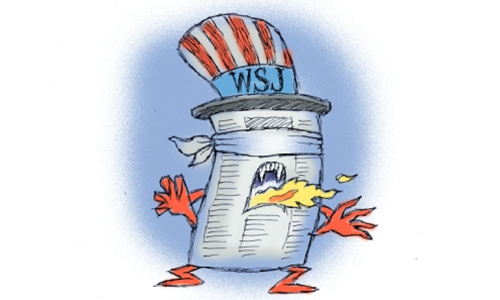HOME >> OPINION
Wall Street Journal must apologize for anti-China op-ed
Source:Global Times Published: 2020/2/26 12:23:40

Illustration: Peter C. Espina/GT
Fifty-three reporters and editors at the Wall Street Journal (WSJ) have signed a letter asking top executives of the paper to consider changing its controversial headline "China Is the Real Sick Man of Asia" and apologize. The Global Times also learned that senior executives of the WSJ wrote a second letter to the Chinese side, saying they recognize the harm and fury the headline has caused.
Chinese Foreign Ministry spokesperson Zhao Lijian also questioned on Monday why the WSJ had the audacity to slander but lacks the courage to make an apology.
The first letter shows that those signatories at the WSJ still have a relatively objective understanding of China. Although they signed the letter partly because of their own interests, the letter still reflects that they personally agree that the racist headline is a serious violation of journalistic ethics.
The WSJ has every reason to apologize. The article used a phrase that has infuriated Chinese people, and it has hurt the feelings of all Chinese people. Such a move is extremely vicious and unacceptable.
The racist phrase "sick man of Asia" had not been used for a long time until the WSJ brought it back. Racial discrimination is a violation of the UN International Covenant on Civil and Political Rights as well as the UN Charter. It shows that some Westerners are deeply immersed in the "China threat theory."
If the WSJ still refuses to apologize, there may be very serious consequences. China's Foreign Ministry announced on February 19 that it would revoke the press credentials of three WSJ reporters working in Beijing. And under such pressure, the WSJ article may affect not only a certain reporter or editor but may worsen China-US relations entirely.
Racial discrimination is one of the most sensitive topics in the US, and nobody should make racist remarks, including the US president. However, the WSJ has been refusing to apologize, claiming that "the Journal operates with a strict separation between its news and opinion staff." But all media outlets give articles a final review before they are published. If an opinion article is published, it more or less represents the outlet's position. The WSJ will never publish an article that is completely contrary to its position. Thus, the journal's explanation does not hold water.
"Comment is free, but facts are sacred," said British journalist C. P. Scott in 1921. Indeed, criticism based on objective facts is acceptable. But the racist phrase "sick man of Asia" is linked to a period when China was brutally humiliated by Western imperial powers. Using the insulting phrase is a serious mistake. If the WSJ refuses to apologize, the Chinese people will lose trust in the journal, as well as other mainstream US media. Besides, China can consider filing a lawsuit under US law if the journal does not apologize.
The letters signed by reporters, editors and senior executives show there may be a division within the WSJ. The WSJ staff may already have disputes on economic interests and ways of reporting.
From a wider picture, the headline and the joint letters demonstrate that there has been division in the US concerning China-US relations. In the US, there are two positions on China's rise -- one is acceptance and cooperation, and the other is smearing and hindering. The whole incident reflects the differences between two groups of people in the context of China-US relations.
The article was compiled by Global Times reporter Li Qingqing based on an interview with Zhu Wei, professor and communications researcher at China University of Political Science and Law. opinion@globaltimes.com.cn
Newspaper headline: WSJ must apologize for anti-China article
RELATED ARTICLES:
Posted in: VIEWPOINT